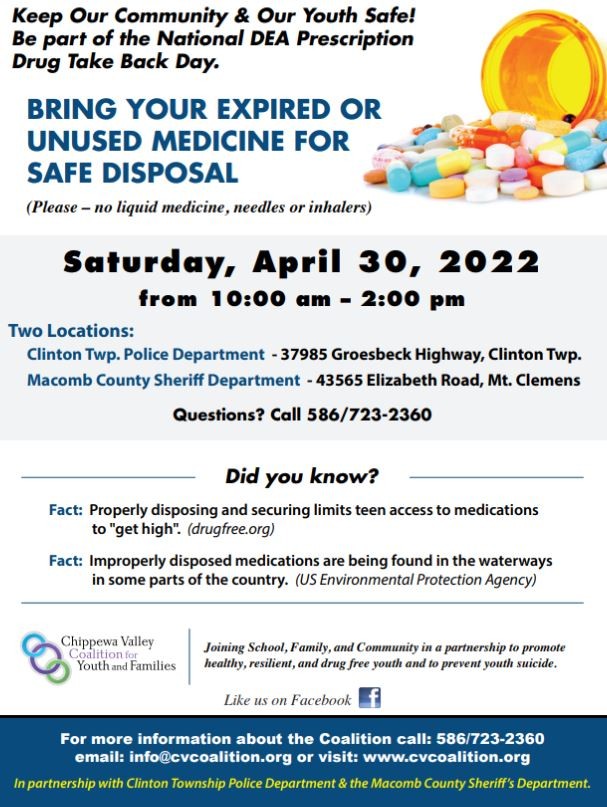Friends, I hope you all can get outside and enjoy some sunshine on Earth Day, which is today! As the weather continues to warm up, consider enjoying the parks and recreation areas in our community. They are wonderful places to get some exercise and meet up with friends. Remember to leave the area as you found it by depositing trash in marked cans or by taking it home and disposing of it there. In this newsletter, you will find an Earth Day announcement from Gov. Whitmer about reducing Michigan’s carbon emissions, event information for a Prescription Drug Take Back Day on April 30, a reminder to call and get buried utility lines marked on your property before digging, and information on what you can do to help reduce the spread of the avian flu right in your own backyard. If you have any questions, would like to comment on pending legislation, or resolve any issues in state government, please do not hesitate to contact my office by phone at (517) 373-8360 or by email at SenPWojno@senate.michigan.gov. Warmest regards, |
Paul Wojno MI HEALTHY CLIMATE PLAN TO CREATE GOOD-PAYING JOBS, PROTECT AIR AND WATER On Thursday, April 21, the Michigan Department of Environment, Great Lakes, and Energy (EGLE) released the MI Healthy Climate Plan, a roadmap for Michigan to achieve economy-wide carbon neutrality by 2050. The MI Healthy Climate Plan proposes climate action that would create tens of thousands of clean energy jobs, spur economic development and innovation, protect clean air and water, and improve public health. It builds off the leadership of tribal communities, cities and towns across Michigan, as well as the private sector. It also positions Michigan as a climate action leader with a focus on actions to spur economic development and create good-paying jobs, lower energy and transportation costs for working families and businesses, work towards energy independence, mitigate the worst impacts of climate change, improve public health, and protect natural resources and wildlife. Additionally, the MI Healthy Climate Plan identifies what needs to happen for Michigan to reach carbon neutrality by 2050 with a prioritization on actions from now until 2030. The plan’s recommendations fall around six pillars:
The full plan can be found here. NATIONAL DEA PRESCRIPTION DRUG TAKE BACK DAY IS APRIL 30 To protect our fellow community members and our environment, it’s important to safely dispose of expired or unneeded prescription medications. Saturday, April 30, 2022, the Clinton Township and Macomb County Sheriff Offices are partnering to host this event as a part of National DEA Prescription Drug Take Back Day. |
As sunshine and warmer temperatures tempt Michiganders to begin backyard improvements or even bigger construction projects, the Michigan Public Service Commission and MISS DIG 811, the state’s underground utility locator, are reminding residents to first call 8-1-1 to have buried utilities marked for safety before putting a shovel in the ground. Anyone planning a project that involves digging can call at least three business days in advance to ensure underground utilities aren’t damaged, which can lead to dangerous and potentially deadly consequences, regardless of the size of the excavation project. The call is free, and you will be able to have trained workers from utility companies come out and clearly mark (with spray paint or flags) where buried gas, electric, water and sewer lines, phone, and other underground utilities are located on your property. Instead of calling, you can also visit MISSDIG811.org to fill out a request form online. TEMPORARY REMOVAL OF BIRD FEEDERS CAN HELP REDUCE SPREAD OF AVIAN INFLUENZA As Michigan continues to respond to detections of highly pathogenic avian influenza, commonly referred to as “bird flu,” some residents are asking questions about how best to keep themselves, their poultry flocks, and wild bird populations safe. This is of greater interest now, as many birds make the spring migration back to Michigan and seek out food sources such as backyard bird feeders. With HPAI (Highly Pathogenic Avian Influenza) confirmed in wild birds and domestic flocks in several counties throughout Michigan, wildlife and animal health experts in the state’s departments of Natural Resources and Agriculture and Rural Development have been fielding increased calls about the HPAI virus. One effortless way the public can help reduce the potential spread of HPAI is to remove outdoor bird feeders. Though there is not yet any widespread recommendation from state agencies to do so, temporary removal of these food sources could be helpful, especially for anyone who has highly susceptible species — domestic poultry, raptors, or waterfowl — living nearby. Similarly, removal could be a wise choice for those who observe high-risk species like blue jays, crows, or ravens hanging around backyard bird feeders. This temporary removal of bird feeders and baths may only last for the next couple of months, or until the rate of HPAI spread in wild and domestic birds decreases. If people choose to continue using their bird feeders, please keep this guidance in mind:
Domestic bird owners and caretakers should watch for unusual deaths, a drop in egg production, a significant decrease in water consumption, or an increase in sick birds. If avian influenza is suspected, immediately contact MDARD (Michigan Department of Agriculture and Rural Development) at 800-292-3939 (daytime) or 517-373-0440 (after hours). Follow the status of HPAI in Michigan counties at Michigan.gov/BirdFlu.
|
As an elected representative, I believe in being readily available and transparent because my office is your office. |




